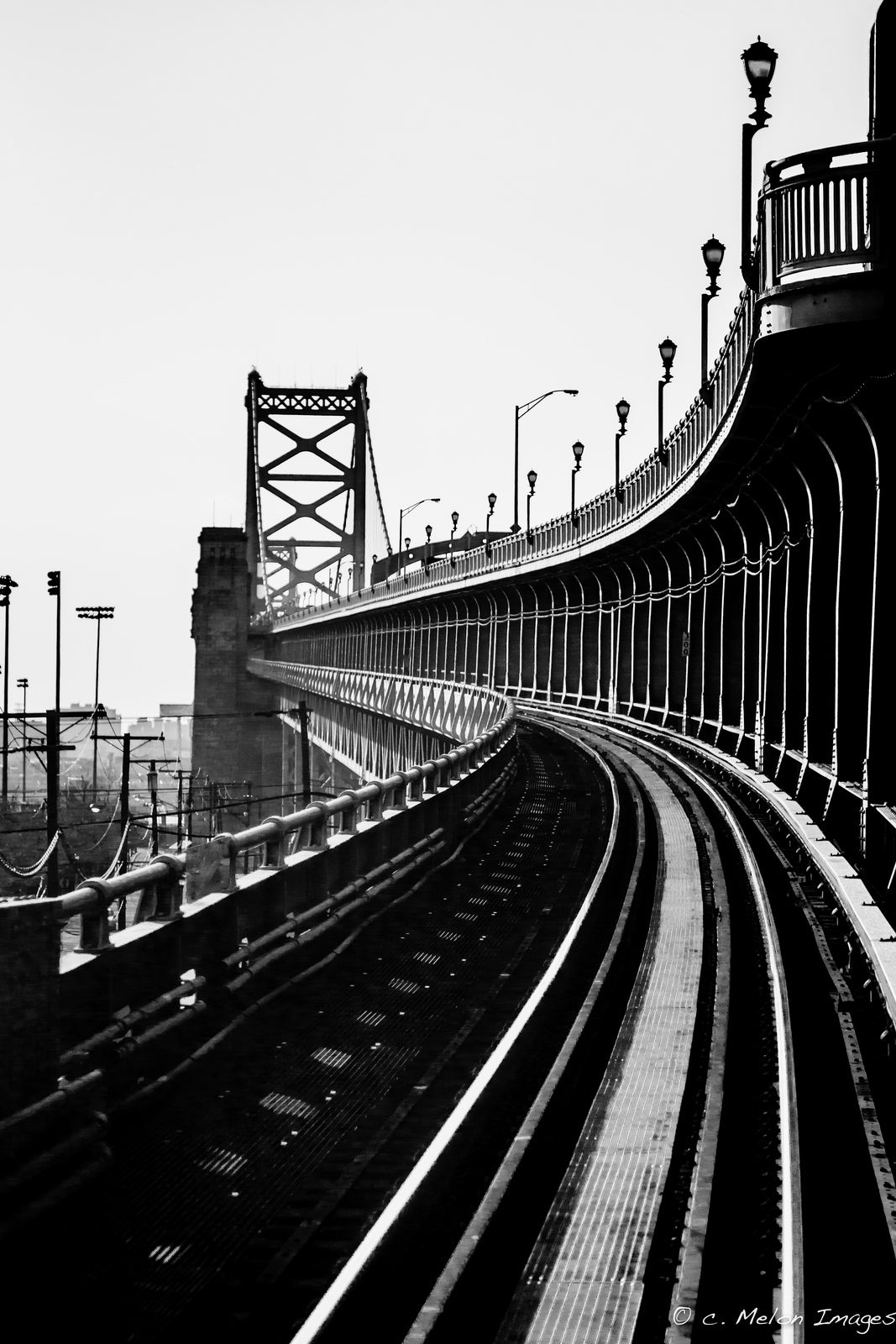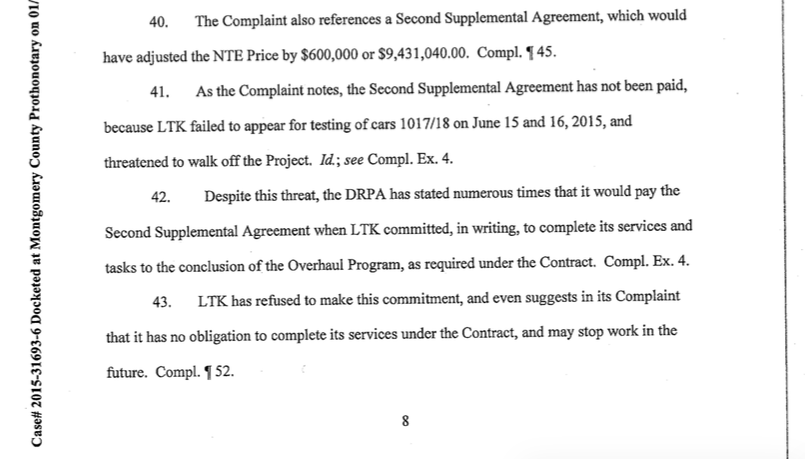Engineering consultant sues Port Authority for $2 million in back pay on PATCO refurbishment project

LTK Consulting Services is suing the Delaware River Port Authority (DRPA) for over $2 million, alleging the authority breached its contract with the engineering firm. The lawsuit, filed in Montgomery County, claims that LTK consultants have worked thousands of hours without pay on the long-delayed PATCO railcar refurbishment project.
DRPA decided to rebuild its fleet of 121 railcars, rather than purchase new ones, signing an $8.3 million contract with LTK in 2007 to advise on the engineering for the project. In 2010, DRPA hired Alstom Transport Inc. to handle the actual construction for $194 million. The project was supposed to finish in 2015, but the first prototypes were delivered a year behind schedule, and the first cars only entered service last May. Delivery of the last cars isn’t expected until fall 2017.
LTK’s decision to sue isn’t so much a business decision as a divorce. The Delaware River Joint Commission, DRPA’s predecessor, became LTK’s first rail transportation client back in 1935. When DRPA finally launched PATCO in 1969, LTK served as the procurement consultants for the original railcars – the very same being refurbished today. Since that original procurement, LTK performed every DRPA bondholder-required vehicle inspection (except for one), as if celebrating an anniversary.
LTK has around 280 employees, who mostly focus on rail systems engineering. The PATCO refurbishment isn’t the Ambler-based firm’s only long-delayed consulting project into the region: LTK has also consulted on SEPTA Key.
Even if the parties eventually settle this lawsuit, the marriage is likely dead. Suing a client, particularly a governmental entity, is a drastic move. An LTK spokesman told PlanPhilly that the company had never sued a client—any client, public or private—for non-payment in its 94-year history.
Industry observers told PlanPhilly that this sort of thing was almost unheard of. Often hundreds of pages long and heavily negotiated, consulting contracts tend to leave little wiggle room for legal disputes over their meaning. And the desire to maintain the business relationship—or at least not air dirty laundry in a public court filing—usually pushes the parties to strike a compromise, rather than resort to litigation.
“This is not something that anyone would chose as a first course of action,” said Kevin Feeley, a spokesman for LTK. “We filed the lawsuit because we felt we had no alternative.”
When asked to respond, DRPA CEO John Hanson said: “First of all, I’m surprised and disappointed by the lawsuit,” DRPA CEO John Hanson said in response to Feeley’s comments, adding: “I’m also surprised that they would say that.”
“This is sort of unprecedented history for us,” said DRPA CEO John Hanson. “We have a long history of being able to work this out with our contractors.”
When asked if DRPA would consider working again with LTK, Hanson paused briefly and then said: “I don’t have a definitive answer on that, because there are chapters still to be written in this story.”
“But,” Hanson added, “relationships are very important, and who I like to work with is based on… being able to trust the way the person will behave and faith in their competence.”
LTK’s complaint argues that the company deserves to be paid for what it calls “unbudgeted” and “additional” work on the tardy project. According to the lawsuit, the consulting contract was supposed to last 77 months. It’s been more than 100 months now.
The complaint blames Alstom for the blown deadlines: “LTK is not responsible for keeping the Project on schedule — that responsibility resides contractually and logically with the car overhaul contractor, Alstom.”
DRPA RESPONDS
In an answer filed January 28, DRPA counters that LTK signed a contract requiring the firm to provide “all professional, technical and other services… necessary to accomplish, perform and carry to conclusion… all tasks related to PATCO Transit Car Overhaul Program.” The DRPA filing also points to the contract’s compensation provision, which says that LTK’s total compensation “shall not exceed” $8,331,070. Combined, DRPA’s lawyers argue, this means LTK agreed to a hard cap on remuneration, taking on the risk of the unforeseen problems that have plagued the project.
Hanson, echoing the language used in DRPA’s preliminary objections, said LTK’s lawsuit was premature. “We’ve maintained all along that there is a process in the contract where if they think that they’re being required to do work not required under the contract, there is a process under the contract: They have to give an explanation, a justification, [and] specific examples. And we haven’t gotten that yet.
“If it’s something that’s outside the scope, give us documentation; we’ll evaluate it and let you know if we agree,” said Hanson. “We haven’t gotten there yet because they haven’t given us any specifics.”
LTK did manage, at least once, to convince the DRPA to pay it for work deemed outside the scope of the original agreement, executing a supplemental agreement in November 2014 that increased the total compensation by $500,000, to $8.83 million. As of March 2015, LTK had been paid $8,501,126.
At its May meeting, the DRPA Board authorized a second supplemental agreement for $761,453. But a second agreement was never signed, and the DRPA never paid that amount, which would have included $600,000 for construction monitoring costs, $27,552 for “project delay analysis” and $133,931 to evaluate change orders requested by Alstom.
In their court filing, DRPA says it decided not to pay the second supplemental because LTK failed to show up to a vehicle testing in June. When PlanPhilly asked Hanson about the second supplemental, DRPA’s outside counsel, Patrick Kearney of Duane Morris LLP, stepped in before Hanson could answer and referred PlanPhilly to paragraphs 41-43 of the filed answer for the DRPA’s official comment on the matter.

Kearney is a partner at Duane Morris LLP, who is defending DRPA in this litigation. Duane Morris has also represented the authority in a federal grand jury investigation into DRPA’s spending on economic development projects. Drinker Biddle & Reath LLP represents LTK.
In addition to the breach of contract claim, LTK’s complaint also alleges breaches of oral and implied contract, and unjust enrichment. To succeed on those claims, LTK will need to convince a judge that the unbudgeted work was performed outside the scope of the original agreement.
After LTK purportedly skipped the railcar inspection in June, DRPA’s acting general counsel, Kristen Kirk Mayock, shot LTK a strongly worded letter, accusing them of attempting to “re-write [sic] the terms of the Contract to shift the allocation of [cost overrun] risk onto the DRPA, without any legal cause or justification.” The letter went on to say that the DRPA was “willing to negotiate a second price adjustment to compensate LTK for additional delays caused by Alstom,” but only if LTK provided “written assurance” that it would “complete its obligations under the Contract.”
LTK’s complaint calls Mayock’s interpretation of the contract “absurd.”
LTK continues to work on the project while the suit is pending. The company’s spokesman said LTK still hopes to resolve the dispute amicably. Hanson said he also hoped things could be resolved. But, Hanson added, the DRPA has an obligation to the community to be careful with its finances
“I’m not going to allow the threat from a consulting agency of some bad press pressure me into giving them some money that I’m not sure they deserve.”
WHYY is your source for fact-based, in-depth journalism and information. As a nonprofit organization, we rely on financial support from readers like you. Please give today.



